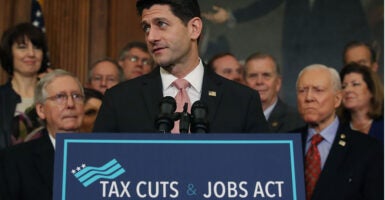A top priority for the incoming 119th Congress and the second Trump administration should be to extend and build upon President-elect Donald Trump’s 2017 tax cuts, most of which are set to expire after December 2025.
The stakes are high. If the tax cuts are allowed to sunset, Americans would face the largest tax hike since World War II.
The 2017 tax legislation—which included tax reductions for individuals, small businesses, and corporations—was one of the signature achievements of Trump’s first term and helped drive the booming economy of the Trump years.
Americans for Tax Reform compiled an impressive list of 1,233 known examples of companies announcing pay raises, job creation, employee bonuses, benefits increases, and business expansions that were made possible by the tax cuts.
The unemployment rate fell to 50-year lows. Median real wages grew as much in the two years following the tax cuts as they had in the 30 years leading up to the tax cuts. Inflation declined slightly, remaining at a historically low rate. Corporate inversions were halted and, in some cases, reversed. And Americans enjoyed major simplification in tax filing.
The bottom line: Americans were allowed to keep more of the money they earned, and they were earning more of it. The good times would have continued if not for the Black Swan event that was COVID-19.
But if not for the Trump tax cuts, we’d be in a much worse position today than we are. U.S. businesses would have entered the 2020 pandemic with among the highest taxes in the developed world and with significantly less financial cushion to absorb the economic shock of the pandemic. Fewer businesses would have survived the lockdowns, and the road to economic recovery would have been longer and more painful.
Since the pandemic, the American economy and the American people have endured the consequences of inflationary government spending, overregulation, and misguided new taxes, such as new taxes on natural gas, oil, and stock buybacks, as well as a new corporate alternative tax.
The empowerment of government over private individuals and businesses has left the economy on shaky ground.
Doubling down on the failed government-centric approach of the past four years and allowing a historically large tax increase would be a huge mistake and would leave America at risk of a major recession.
Lawmakers shouldn’t allow it.
Congress should act to deliver a budget-reconciliation package to the president’s desk that includes an extension of the critical pro-growth tax provisions from the 2017 legislation.
That includes allowing companies to fully and immediately deduct purchases of equipment and machinery instead of subjecting them to convoluted depreciation schedules of up to 20 years that complicate tax filings, make small businesses vulnerable to inflation, and punish companies for investing in the tools that allow their employees to become more productive and to command higher wages.
Likewise, Congress should ensure that companies can fully and immediately deduct research and development costs in determining taxable income. There’s no sound rationale for biasing the tax code against forward-looking companies seeking to develop new products or to improve on existing ones.
Congress should also stop the expansion of the death tax that is set to take effect after 2025. The 40% death tax is a killer for family businesses and farms. It hits families in their time of loss, and it all-too-often forces desperate family members to auction off the decedent’s life’s work to the highest bidder.
Congress also should act to stop or mitigate the looming tax-rate hikes, which—if allowed to take effect—would particularly hammer small-business owners.
Altogether, the government scorekeepers at the Joint Committee on Taxation will likely claim that extending current tax policies with no spending cuts or new revenue-raisers would add about $4 trillion to the national debt over 10 years.
For the government scorekeepers, tax hikes are baked into the baseline. Conservatives in Congress have grown increasingly skeptical of the reliability of government scorekeepers’ budget scores. And justifiably so, as enormous errors from the scorekeepers facilitated deficit-busting policies like the trillion-dollar green energy subsidies that were passed during President Joe Biden’s administration. And government prognosticators have always undersold the benefits of pro-growth tax cuts.
Nonetheless, a reconciliation package that avoids a large deficit hole will have an easier time passing. But more importantly, if Congress passes a reconciliation package that pairs an extension of the tax cuts with spending cuts and other deficit-reduction measures, businesses and individuals will have more faith that the tax cuts will last and will be able to plan and invest accordingly.
Out of the $6.8 trillion of annual federal spending, there’s a lot of room to cut, and the incoming Trump administration has signaled that it’s serious about making the government leaner and more efficient.
Part of the effort to make government more efficient should include making taxes more efficient. The tax code is littered with trillions of dollars of carveouts and special-interest subsidies, such as Biden’s Green New Deal tax credits that pick winners and losers across the economy.
Most of these subsidies are formally miscategorized and not recorded as government spending, but they’re still coming out of the pockets of the American people.
The 2025 tax package should be part of a broader reconciliation deal that acts as a rebuke to those special interests who have benefited from business as usual in Washington, D.C.
On Nov. 5, the American people delivered a mandate for low taxes, a secure border, common sense, and a leaner government that works for the people—instead of the other way around.
Now it’s time for Congress to stand and deliver.






























